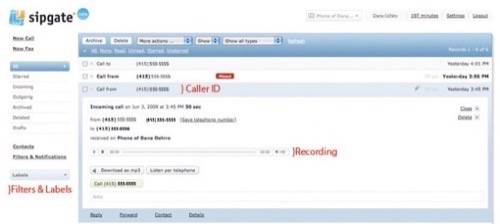We hate to burst your bubble, but the ReadWriteWeb newsroom is not the luxuriant, mahogany den of intellectualism that you envision. Instead, we discuss the greater points of start ups, enterprise and the tech world via conference chat in the comfort of our pajamas. When you’ve got a virtual team, tools like chat, email and voice over IP are your lifeline. Sipgate founder Thilo Salmon hopes his recent launch of sipgate one VoIP will add new work features where Skype, Fring and Jajah mobile have left off.

Currently headquartered in San Francisco, sipgate already has a six figure user base in Europe where it has successfully built a telecom presence since 2004. Salmon first started in the industry in 1998 when he and a college friend launched a widely popular telecom blog and web-based text messaging service. Today, the VoIP company is offering American users a month’s worth of 200 free minutes to call out, a free U.S. phone number (From a choice of 74 area codes in 21 states), fax capabilities, call forwarding and paid voicemail service. Other features of note include call recording (for all you Wire fans). However, what really sets sipgate apart is its Gmail-like interface.

Users can create filters and labels in addition to keeping their faxes, recordings and call history in the same space. The tool is an obvious fit for contract employees who are expected to keep a record of their meetings. In the future, sipgate is planning a multi-user version of the service and a “mark as spam” feature to keep away unwanted solicitors. While Skype and Fring offer chat functionality, sipgate takes a more bare bones approach to VoIP and does it well.
“We wanted to create a service that feels and behaves like an email service on the web – our German version of sipgate was just that.” Says sipgate CEO Thilo Salmon, “After a complete reengineering of our platform to cover the increasing number of features, taxes and regulatory requirements as well our heightened sense security and resilience needs, we have just introduced this service in the U.S.”
The company is well-equipped to weather setbacks and restrictive legislation. Last year it challenged T-Mobile Germany in court on its threat to add additional fees to VoIP, instant message and virtual private networks (VPN). In addition to the uproar amongst German Skype users, the court battle is likely to have been one of the inciters in T-Mobile’s recent decision to remove the VoIP prohibition and create their own VoIP plan at a rate of 10 Euros per month. The decision is a testament to the fact that VoIP has become a very real alternative to traditional telephony in major (and wired) cities. You might say that in the upstream struggle to woo users from their landlines, Salmon and VoIP are thriving.

















